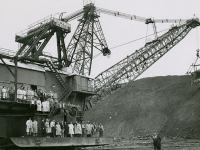Answer: Coal mining
Tench Coxe owned over one million acres, much throughout Northeastern Pennsylvania. Coxe was a statesman, author, and land speculator whose investments did not prove profitable in his lifetime.
Coxe, who was born in Philadelphia in 1755, joined his father’s mercantile firm, then eventually turned to a career in public service. During the American Revolution, Coxe’s Loyalist sympathies complicated his political ambitions and he was once accused of treason for collaborating with the enemy. He swore an oath of allegiance to the United States and retained the respect of his patriot neighbors, receiving a variety of public office appointments under George Washington, Alexander Hamilton, and Thomas Jefferson.
Anthracite coal was discovered in Pennsylvania in the late 1760s, and Coxe began to purchase promising acreage in 1790. Though he acquired land throughout the country, he particularly focused on land in Carbon, Luzerne, and Schuylkill counties, which he believed held vast underground seams of coal. Coxe worked diligently to retain these properties that he believed would bring wealth to future generations of the family. When Coxe died on July 16, 1824, his son Charles Sidney Coxe was the sole executor of his estate, which was composed of approximately 1.5 million acres in eight states. Indeed, his purchases would secure wealth for the Coxe family and all their mining enterprises well into the twentieth century.
HSP holds both the papers of Tench Coxe (#2049) and the Coxe family's mining operation (#3005). While the Coxe family mining papers focus on early America coal mining operations, the Tench Coxe papers highlight his personal accomplishments as a merchant and land speculator.
Image: "Coxe family meeting at Drifton Mine," photograph (1956)

